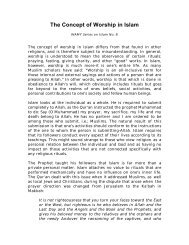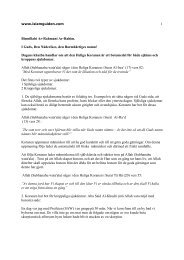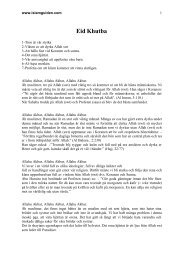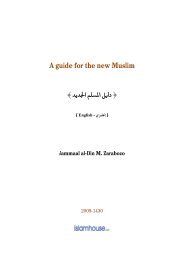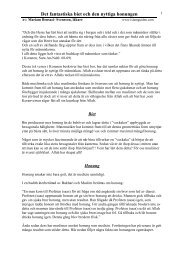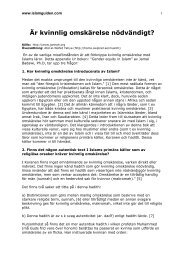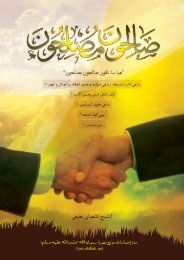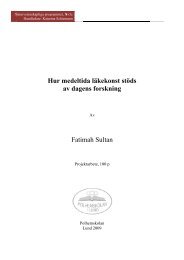The Prophet's Prayer From The beginning To The End As Though ...
The Prophet's Prayer From The beginning To The End As Though ...
The Prophet's Prayer From The beginning To The End As Though ...
You also want an ePaper? Increase the reach of your titles
YUMPU automatically turns print PDFs into web optimized ePapers that Google loves.
<strong>As</strong> for the quiet prayers, he urged them to recite during them; Jaabir said, "We used to recite behind<br />
the imaam in Zuhr and '<strong>As</strong>r: soorah al-Faatihah and another soorah in the first two rak'ahs, and<br />
soorah al-Fatihah in the last two." 144<br />
However, he dissuaded them from confusing him with their recitation, when:<br />
"he prayed Zuhr with his Companions and said (afterwards): Which of you recited "Glorify the name<br />
of your Lord the Most High" (soorah al-A'laa, 87) Someone said: It was I [but I was only intending<br />
nothing but good by doing so]. So he said: I knew that someone was contending with me by it. 145 In<br />
another hadeeth: "<strong>The</strong>y used to recite behind the Prophet (sallallaahu 'alaihi wa sallam) [loudly], so<br />
he said: You have mixed up my (recitation of the) Qur'aan. 146<br />
He also said: Truly, the person praying is privately consulting his Lord, so he should be careful about<br />
what he consults him with, and you should not recite the Qur'aan loudly over each other. 147<br />
He also used to say: Whoever recited a harf (letter) from the Book of Allaah, it will count for him as<br />
one good deed, and a good deed is worth ten times over. I do not mean that "alif laam meem" is a<br />
harf, but "alif" is a harf, "laam" is a harf, and "meem" is a harf. 148<br />
<strong>The</strong> aameen, and the Imaam's saying it Loudly<br />
When he (sallallaahu 'alaihi wa sallam) finished reciting al- Faatihah, he would say:<br />
("aameen") loudly, prolonging his voice. 149<br />
He also used to order the congregation to say aameen: When the imaam says,<br />
"Not of those who receive (Your) anger, nor of those who go astray", then say "aameen" [for the<br />
angels say "aameen" and the imaam says aameen"] (in another narration: when the imaam says<br />
"aameen" say "aameen"), so he whose aameen coincides with the aameen of the angels (in another<br />
narration: when one of you says "aameen" in prayer and the angels in the sky say "aameen", and they<br />
coincide), his past sins are forgiven. 150 In another hadeeth: ... then say aameen; Allaah will answer<br />
you. 151<br />
He also used to say: <strong>The</strong> Jews do not envy you over anything as much as they envy you over the<br />
salutation and aameen [behind the imaam]. 152<br />
<strong>The</strong> Recitation after al-Faatihah<br />
Next, he (sallallaahu 'alaihi wa sallam) would recite another soorah after al-Faatihah, making it long<br />
sometimes, and on other occasions making it short because of travel, cough, illness or the crying of<br />
infants.<br />
٣٠




